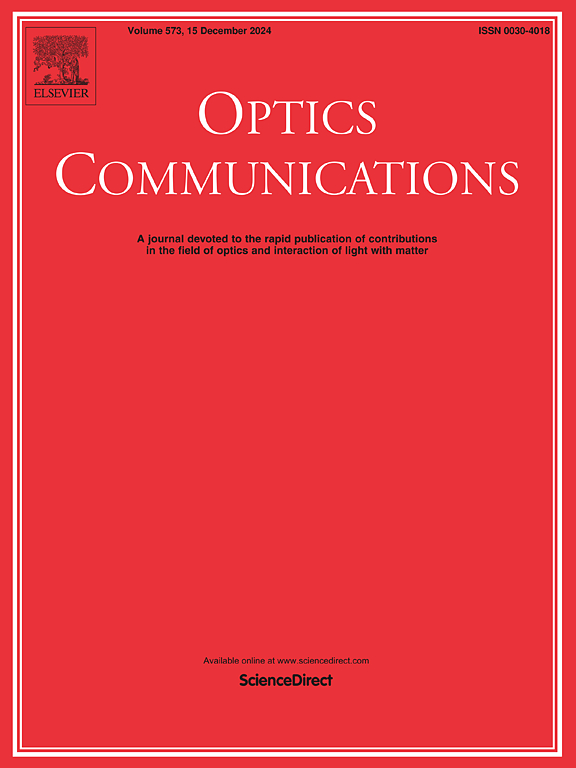ROF-based antenna-PDM system employing DSM and DD-weight-pruning Volterra nonlinear equalization
IF 2.2
3区 物理与天体物理
Q2 OPTICS
引用次数: 0
Abstract
The radio over fiber (ROF) system based on Delta-sigma modulation (DSM) can meet the requirements of the fronthaul system with its high signal fidelity and mature digital fronthaul interface specification. However, nonlinear impairments in ROF systems can seriously affect the performance of DSM signals. To reduce the impact of nonlinear effects on DSM signals with low complexity, we have designed a nonlinear equalizer based on the Volterra series. The complexity of the Volterra nonlinear equalizer (VNLE) is reduced through a weight pruning strategy. And by using directed decision instead of training sequences, we eliminate the redundancy introduced by VNLE while simultaneously ensuring its stability within the DSM system. Ultimately, we transmit one-bit single-carrier loaded DSM signals over 20 km of SMF-28 fiber and 3 m of wireless distance in an antenna polarization division multiplexing (APDM) intensity modulation and direct detection (IM/DD) system. For the first time, we add decision-directed weight-pruning Volterra nonlinear equalization (DD-PVNLE) algorithm in the APDM-IM/DD system to overcome the signal damage by the nonlinearity of the system. The BER of the Delta-sigma modulated on-off keying (DSM-OOK) signal reduces from 1 × 10−3 to 1.1 × 10−4. The high-fidelity 1024QAM, 2048QAM, and 4096QAM are recovered successfully whose BERs below the soft decision threshold 2.4 × 10−2 and hard decision threshold 3.8 × 10−3 respectively.
基于 ROF 的天线波分复用系统,采用 DSM 和 DD 权重剪切 Volterra 非线性均衡技术
基于Δ-Σ调制(DSM)的光纤射频(ROF)系统具有高信号保真度和成熟的数字前传接口规范,可以满足前传系统的要求。然而,ROF 系统中的非线性损伤会严重影响 DSM 信号的性能。为了以较低的复杂度降低非线性效应对 DSM 信号的影响,我们设计了一种基于 Volterra 系列的非线性均衡器。通过权重剪枝策略降低了 Volterra 非线性均衡器(VNLE)的复杂性。通过使用定向决策而不是训练序列,我们消除了 VNLE 带来的冗余,同时确保了其在 DSM 系统中的稳定性。最终,我们在天线极化分复用(APDM)强度调制和直接检测(IM/DD)系统中,通过 20 千米的 SMF-28 光纤和 3 米的无线距离传输单比特单载波负载 DSM 信号。我们首次在 APDM-IM/DD 系统中加入了决策导向权重剪切 Volterra 非线性均衡(DD-PVNLE)算法,以克服系统非线性对信号的损害。德尔塔Σ调制开关键控(DSM-OOK)信号的误码率从 1 × 10-3 降低到 1.1 × 10-4。成功恢复了高保真 1024QAM、2048QAM 和 4096QAM,其误码率分别低于软判定阈值 2.4 × 10-2 和硬判定阈值 3.8 × 10-3。
本文章由计算机程序翻译,如有差异,请以英文原文为准。
求助全文
约1分钟内获得全文
求助全文
来源期刊

Optics Communications
物理-光学
CiteScore
5.10
自引率
8.30%
发文量
681
审稿时长
38 days
期刊介绍:
Optics Communications invites original and timely contributions containing new results in various fields of optics and photonics. The journal considers theoretical and experimental research in areas ranging from the fundamental properties of light to technological applications. Topics covered include classical and quantum optics, optical physics and light-matter interactions, lasers, imaging, guided-wave optics and optical information processing. Manuscripts should offer clear evidence of novelty and significance. Papers concentrating on mathematical and computational issues, with limited connection to optics, are not suitable for publication in the Journal. Similarly, small technical advances, or papers concerned only with engineering applications or issues of materials science fall outside the journal scope.
 求助内容:
求助内容: 应助结果提醒方式:
应助结果提醒方式:


